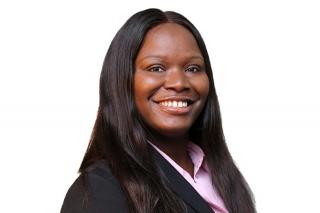Tozoe Marton, MS, is a Ph.D. student at Brandeis University's Heller School for Social Policy and Management. She has done research with the Women's Global Health Imperative Group at Research Triangle Institute (RTI) International as a public health analyst. While at Simmons, Marton co-founded the African-Caribbean Student Union at Simmons, served on the Black Student Union and Class Secretary, and was chosen as the Commencement speaker for the Class of 2018. We caught up with Marton, who shared how Simmons was the foundation of her academic career.
What led you to Simmons to study International Relations, Sociology, and Economics?
I came to Simmons wanting to be a lawyer specializing in international law, hence my International Relations major. In my sophomore year, I wanted to minor in Social Justice when Professor Becky Thompson suggested I major in sociology.
I remember my first Sociology course I took: Health, Illness, and Society with Assistant Teaching Professor Elise Brenner, is a course that I continue to reference in interviews and personal statements when I am asked about a pivotal event that has shaped my research interest. In the course, Professor Brenner had us watch A Walk to Beautiful, a documentary about women in Ethiopia with obstetric fistula who had to walk to the nearest clinic for treatment. It was very disheartening to see the various barriers women face in their struggle to access care. It was then that I decided to major in Sociology, to learn more about how to solve this problem.
I was also interested in understanding market supply and demand and healthcare spending, which led to a minor in economics. I met Associate Professor Masato Aoki, who is still a friend, today. I became really interested in learning economic theories exploring resource distribution within societies.
You are currently doing your PhD in Social Policy at Brandeis University. What led you to this academic focus?
Social policy doesn't fully capture what I'm doing; it's global health and health policy. I'm interested in women's health, and working to even the playing field, globally. That means dealing with healthcare as a whole, understanding how to influence policies, how policies in health are created, and what research goes into promoting policies and creating programs.
I'm focused on how we can create programs and policies that create equitable healthcare, especially in remote areas around the world. I'm interested in understanding how development and financing influences the health and wellbeing of women; that's my interest in economics coming into play.
I've been looking at international aid in Africa, and how that has influenced the health and well-being of women and children in remote areas. I look at institutions like the International Monetary Fund, which may provide funds to countries, but those funds come with a requirement. This means that the U.S. government has some say in how [aid and health] structures in other countries should exist. How can these funders control this, when they may not know what's best for the people? How much of the money actually reaches people and communities?
Can you tell us about your research with the Women's Global Health Imperative Group at RTI International?
RTI International is a huge institution with a lot of research coming into it; it acts like a university with different schools of thought. While at RTI, I worked on women's global health, focusing on women and HIV. One project involved developing stigma skills to determine how experiencing stigma impacts the use of protection.
As part of this research, I got to travel to Kenya and work with amazing staff and engage with participants and see how they gather their data. It was the most amazing experience. I hadn't been back to Africa since I came to the U.S. at 6 years old, so going back at 26 felt scary at first. But I felt at home — I connected with the people, the food was great, and I learned a lot about myself. I am African, but I'm not Kenyan, so I'm an outsider. I have to learn the cultures and the norms and check my own biases, as well. I've been embedded in privilege for a long time. This is what I want to do in my career: travel and engage with different cultures and people and identities.
Another research project involved product developers on HIV prevention implants. We talked about different possible attributes of an implant — flexible, short term — and tried to gauge what interest users have, and their preferences for certain attributes. Biodegradable implants are a new concept, which will bring up a lot of questions. Also, there is mistrust of researchers among African women because of the history of biomedical research on the continent, so we had to work to disprove the misinformation.
Can you tell us about research you hope to explore in your career?
I'm interested in looking at traditional birth attendants and midwives, and the impact of increasing access to them for women in remote areas, and how that may impact maternal health outcomes. Maternal mortality rates are very high for Black women in this country, and for women in remote areas where access to basic obstetric services it's very difficult. I want to focus my research on improving maternal care services for women. Women bring life into this world — why should that be a death sentence?
How did Simmons prepare you to become a leader in your field?
I wouldn't be where I am if not for Simmons, and the mentors there who guided me. Simmons is my foundation.
Studying international relations at Simmons exposed me to a world outside of U.S. systems. Sociology gave me critical thinking skills. I learned discipline at Simmons. Professor Aoki really trained us to get a deeper understanding of how the economy and market works. Interim Dean Valerie Leiter is a mentor who I still contact all the time — she likes to say that I'm following in her footsteps.

